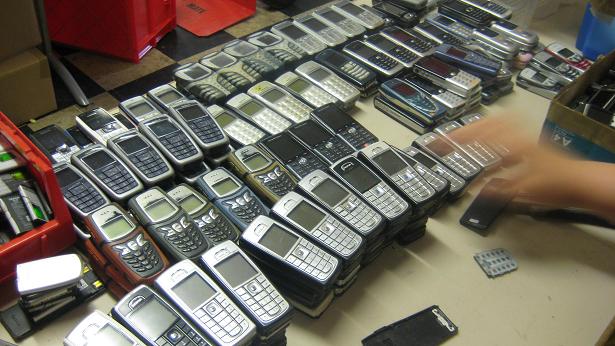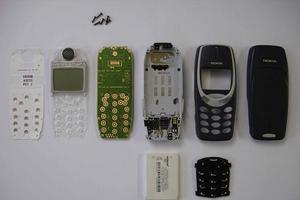The report, 'Please replace the handset: mobile phone recycling in the UK', published by telecoms analysts Ovum, claimed that the increase in competition, in particular from commercial schemes, has made the UK phone recycling market “more cut throat”.
According to the research, eight million mobile phones were recycled in the UK in 2009, double the four million collected in 2008 – with fewer than 10% of those being recycled by being melted down for scrap.
The report claims this is due to the growth of competition from recycling schemes as well as customers becoming more aware of the value of their phones, prompting them to trade in newer handsets than they would have previously got rid of.
With the significant increase in the handsets, the companies involved in buying back phones from the public have emphasised the benefits of their operations in terms of diverting material from landfill.
And, with the majority of handsets ending up in developing countries, they have also highlighted the social and economic benefits the phones offer by connecting people who would not otherwise have access to phone lines.
Competition
The increase in competition was confirmed by Sarah Bond of Regenersis, which operates as a compliance scheme for the likes of Orange and Vodafone and has also worked alongside charities such as Shelter and Children in Need to collect mobile phones since 2002.
“Our volumes have actually decreased as the level of competition has increased over the years,” she told letsrecycle.com, adding that: “The recession also had an impact as people are holding onto their devices for longer.”
The importance of mobile phone recycling for UK producer compliance schemes in general was downplayed by Scott Butler, UK manager of compliance scheme ERP, who highlighted the fact that because mobile phones are classed alongside the likes of laptops and PCs, they have less significance for the UK's weight-based targets.
“It's all under category three and, because it's relatively light it is quite marginal to the whole situation of things,” he said.
Financial
Instead, the Ovum report claims that the growth of the UK market has been driven by what Jeremy Green, the study's co-author, said was “a commercial business model that has moved away from the original intention of responsible recycling and reducing landfill”.
This largely involves handsets being bought back online by schemes, with the value offered to consumers depending on the age and condition of the phone.
Operators told letsrecycle.com that they would buy back almost any phone, but stressed that the majority of phones were either immediately fit for reuse or fit for reuse after being refurbished.
Charlo Carabott, managing director for Mazuma Mobile – which, according to the Ovum report is the joint second largest player in the UK market – explained that just a “handful” were recycled.
“By incentivising people to sell their handsets as soon as they are no longer used, we prevent handsets devaluing to a point where they become almost worthless and therefore likely to become environmental waste,” he added.
His sentiments were echoed by Olly Tagg, director of MPRS Fonebank, who said: “The vast majority of what we get is working and the quality tends to be good. It tends to be stuff people have just stopped using.”
The benefits of refurbishing phones rather than recycling them was emphasised by Mr Tagg, who said that while there was a residual value of around £3 or £4 in a phone, recycling the battery actually represented a cost to his company.
However, the benefits of this approach were questioned by Sarah Bond at Regenersis, who claimed that, with consumers being motivated by the value of their phones, “these buy-back schemes actively discourage people from sending back old phones or those beyond repair as there is no value.”
Testing
With almost all phones collected being sent overseas for reuse, mobile phone recycling schemes stress that they test all phones before exporting them, as a spokesman for the Mobile Phone Xchange scheme explained: “Once a phone has been sent to use, it is inspected by our expert team to determine what condition it is in. If it is in full working order, it is sent overseas.
“If not, we ensure it is recycled to ease pressure on landfill and avoid toxic communication,” he added, noting that, if a phone was a “little faulty”, the company aimed to repair as many of them as possible for reuse.
Regenersis also said that it fully-tested all phones it received at its facility in Essex, as well as scanning them by their IMEI to check them against the crime-related database, allowing it to quarantine phones that might be lost or stolen.
Markets
The lack of a UK market for phone reuse was explained by Mr Carabott from Mazuma Mobile, who said: “There is not much of a market for used phones in the UK where phone contracts are structured in such a way that networks heavily subsidise handsets, making them very affordable.
“Whereas in many developing countries, airtime is often sold separately from the handset. This often means having to purchase a non-subsidised mobile phone. This can be very expensive, so second hand phones become an attractive alternative, particularly among lower income groups,” he added.
This sentiment was echoed by Mr Tagg who said it was “nice to see the important difference affordable mobiles have made to countries”, pointing in particular to their importance in helping to develop businesses in developing countries.
According to the Ovum report, while two years ago the majority of phones ended up in Africa, most are now sold via auction in Hong Kong, which said appeared to be “the hub for handset resale”.
This was echoed by Mr Tagg, who said: “The vast majority go to a trading post like Hong Kong, they're bought in bulk by big trading operations in Hong Kong and dispersed around the globe.”
Traceability
It said: ” A large percentage of phones are sold via auctions as crates full of devices, some are sold directly to third-party dealers which sell on to end users or operators in developing markets, and a small percentage of higher-specification devices are sold to insurance companies in developed markets to be passed back to users as refurbished phones.”
This means that “the majority of handsets are no longer traceable, so many of the MPRSs don't actually know where the final end users reside geographically”, it explained.
This issue was acknowledged by some schemes, with Mr Carabott claiming that Mazuma dealt directly with distributors in Africa and Asia rather than auction houses, and also recorded all phones' International Mobile Equipment Identity (IMEI) numbers, to allow the phones to be tracked if necessary.
Value
The Ovum report noted that, while the average price paid per phone to consumers has increased as they change their model sooner than they would have done previously to maximise its value, this price paid at auction has actually decreased in the last two years.
“This is due to the increased supply of phones and the fact that most are sold in large volumes via auction. While the phones are of a higher quality than before, the auction process has resulted in falling resale prices and commoditised the devices,” it added.











Subscribe for free